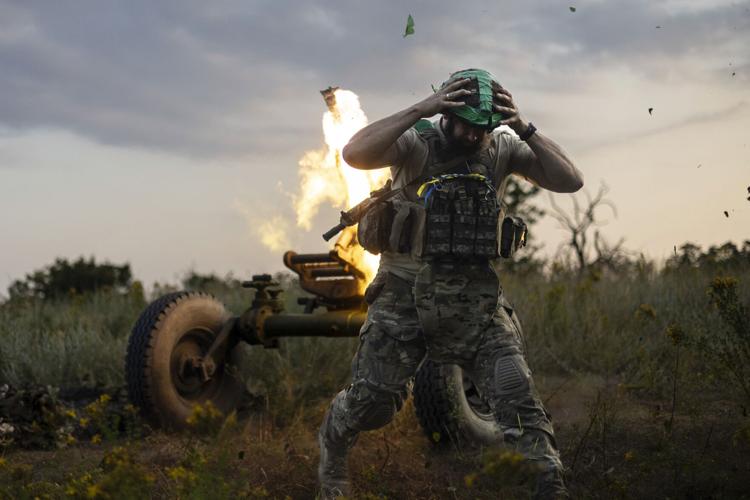Written by Stefan van der Berg (Ministry Leader dia-LOGOS)
The United States has decided to send cluster munitions to Ukraine, multiple news outlets have reported, despite concerns about the deployment of weapons banned by more than 100 countries.
Cluster munitions are a method of dispersing large numbers of tiny bomblets from a rocket, missile, or artillery shell, scattering them over a wide area during mid-flight. While they are designed to explode on impact, a significant proportion of these munitions fail to detonate initially, especially when landing on wet or soft ground.
Military Advantages
Cluster munitions prove effective against mobile or elusive targets, including enemy troops and vehicles. They are also employed against targets spanning broad areas, such as airfields and surface-to-air missile sites. While early submunitions primarily aimed to harm or kill individuals by breaking into fragments, modern versions have diverse effects, some intended to damage vehicles and equipment.
Humanitarian Concerns
The dispersal of numerous submunitions creates a lethal zone that endangers anyone within it, making civilians unintended victims of cluster munitions strikes. These munitions are unpredictable, faulty, and typically unguided, increasing the chances of missing military targets and hitting non-military objects. When used in or near populated areas, civilian casualties become almost inevitable, as observed in conflicts investigated by Human Rights Watch.
The Lingering Threat
of Unexploded Submunitions
Cluster munitions leave behind unexploded submunitions, or duds, which pose a threat to people even after a conflict concludes. These duds can function as de facto landmines, triggered by unsuspecting civilians.
In a global study, Handicap International found that 98% of recorded cluster munition casualties were civilians. However, this does not necessarily mean that this is representative of all submunition casualties. Submunitions pose a greater threat to children than landmines, as they are small, often visible on the ground, and attractive for children to pick up and play with. In 2001 in Kosovo, for example, the ICRC found that children were 4.9 times as likely to be killed or injured by submunitions than by anti-personnel mines.
Incidents involving submunitions were also much more likely than landmines to result in death or injury to several people. Farmers also face risks when encountering duds while working their fields, resulting in socioeconomic consequences such as contaminated agricultural land.
Laos: An Example of the Long-Lasting
Impact
Laos serves as an example of the long-lasting impact, where aerial attacks during the Vietnam War left the country heavily bombed. Despite efforts by the Lao People's Democratic Republic (PDR) to remove the bombs, around 20,000 people—40% of them children—have been killed or injured by cluster bombs or other unexploded items in Laos since the war ended.
Cluster munitions, despite their military advantages, inflict harm on civilians and pose significant humanitarian concerns. Unintended civilian victims and the presence of unexploded submunitions create a long-lasting threat to communities, leading to casualties and socioeconomic consequences.
A Christian Response
Being "a Christian" means accepting the invitation to stand in solidarity with the widespread pain of the world. It requires profound inner freedom to follow Jesus. Embracing His life is a personal decision, a conscious choice, a calling, and a vocation. We have complete freedom to respond with a yes, no, or maybe. Our motivation for doing so is not to earn God's love, as that is already assured. Rather, we do it to reciprocate love to God and to embrace what God loves and how God loves. If we are truly baptized "into his death" and "resurrection," Christianity becomes a transformative force that can change the world.
Jesus, as the embodiment of the "crucified God," revealed that God always stands with those who suffer, regardless of where it is found. This includes both the wounded and dying soldiers on all sides of any war, as well as the victims and perpetrators of injustice in the world. Unfortunately, this truth doesn't please many people. Our society has developed a thriving resistance to suffering.
Perhaps this is why some consider courage to be the foundational virtue underlying all others (cor-agere, an action of the heart). It takes immense courage to walk alongside the suffering of others, including our own.
If God is actively participating in human suffering rather than merely tolerating or observing it, everything changes.
Safia’s Story
Safia Hussein, 23, told the Cluster Munition Coalition about the time her village was heavily bombarded with cluster bombs during the conflict in Southern Lebanon.
“It was horrible for us, during the war we used to go out and gather drinking water from the well, and people from nearby would also go and get food for us. But after the cluster bombardment, I could not go outside for three days because bomblets were everywhere.
When they were firing the cluster bombs, I felt like the house would drop. Many bomblets burst through the wall and came into the house, and I started to panic. The attacks lasted for one and a half hours and then they cooled down for one hour and then they started again.
I heard the sound of each cluster bomb shell for five minutes, like popcorn. We never saw any military activity in this area. We were the targets, the civilians.
I am training to be a nurse at college, but I have had to take leave from my studies to help my mother pick what little remains of the tobacco crop. My brothers are too young to understand the threat from the unexploded submunitions so they are not allowed to help pick the remaining crop.”
Conclusion
Mother Teresa said that in war, there are no winners, only losers. Let us pray for the real victims of this war, the people who are paying a price on both sides.
Let us pray that measures on both sides to further escalate the conflict will not happen, and that sanity will prevail among the leaders.

